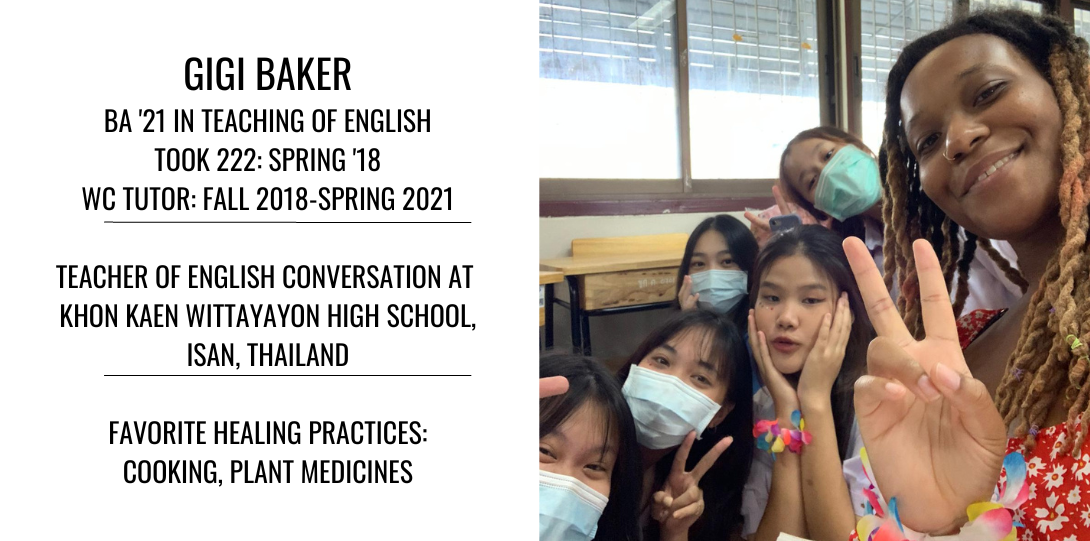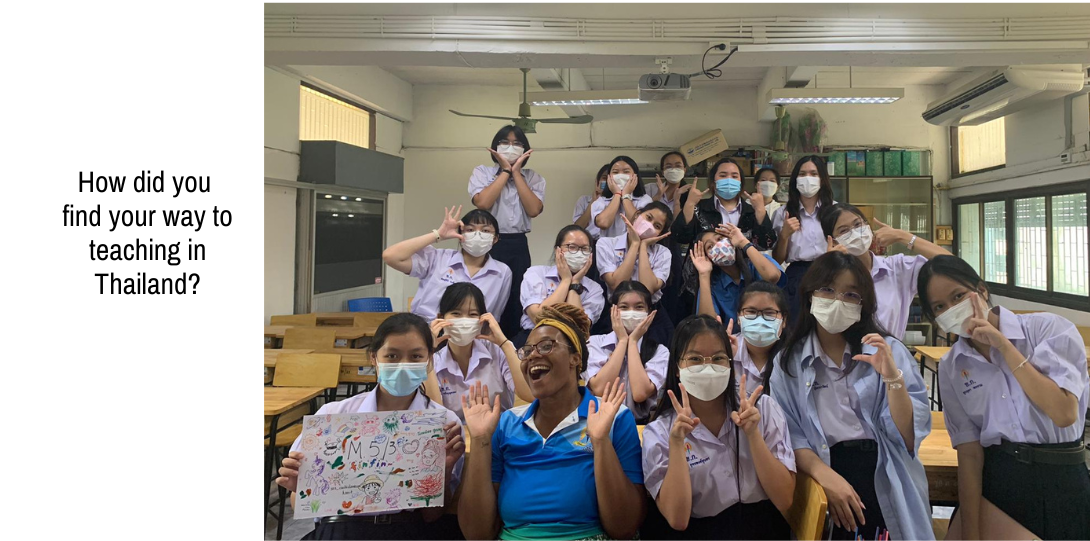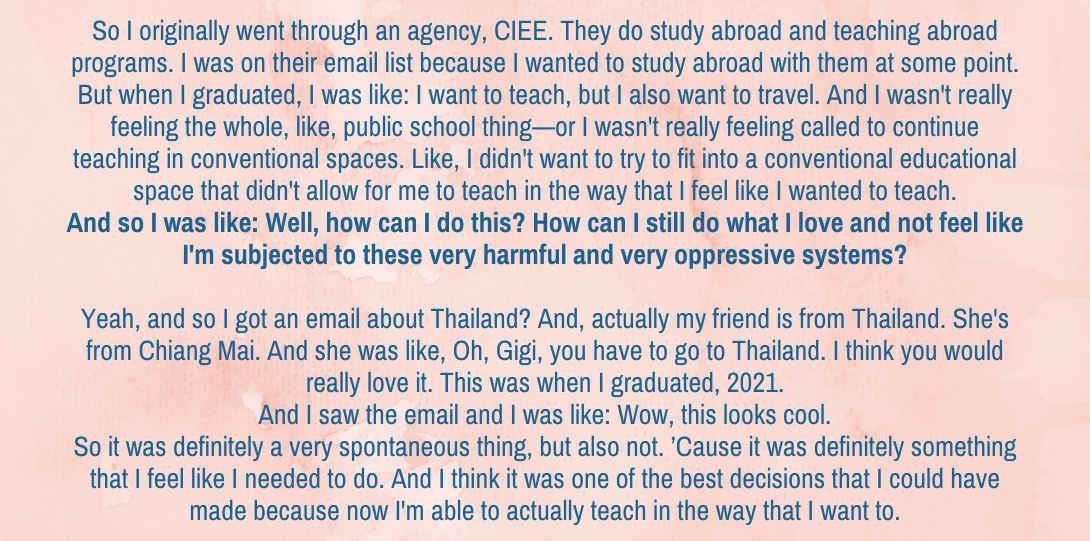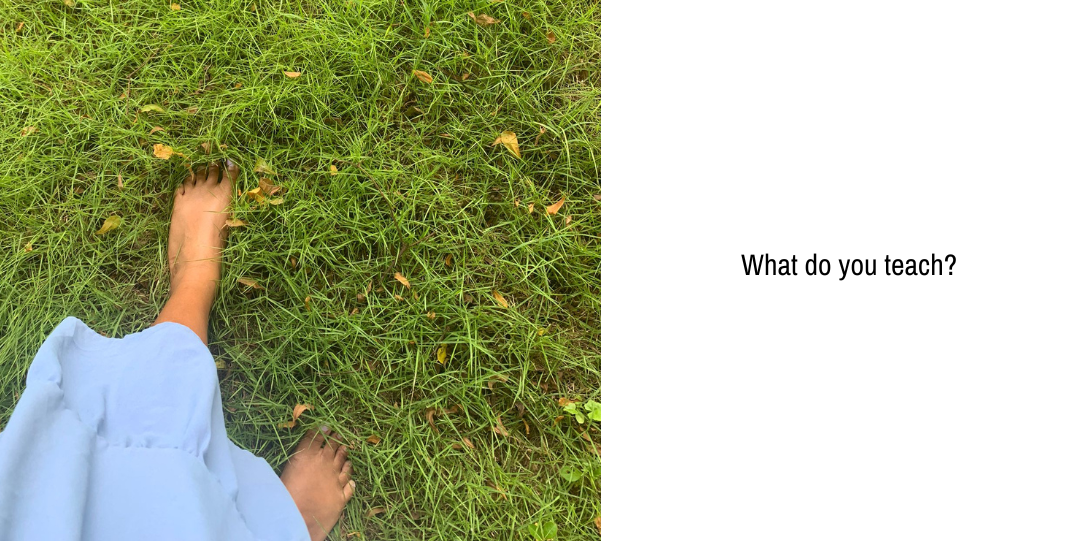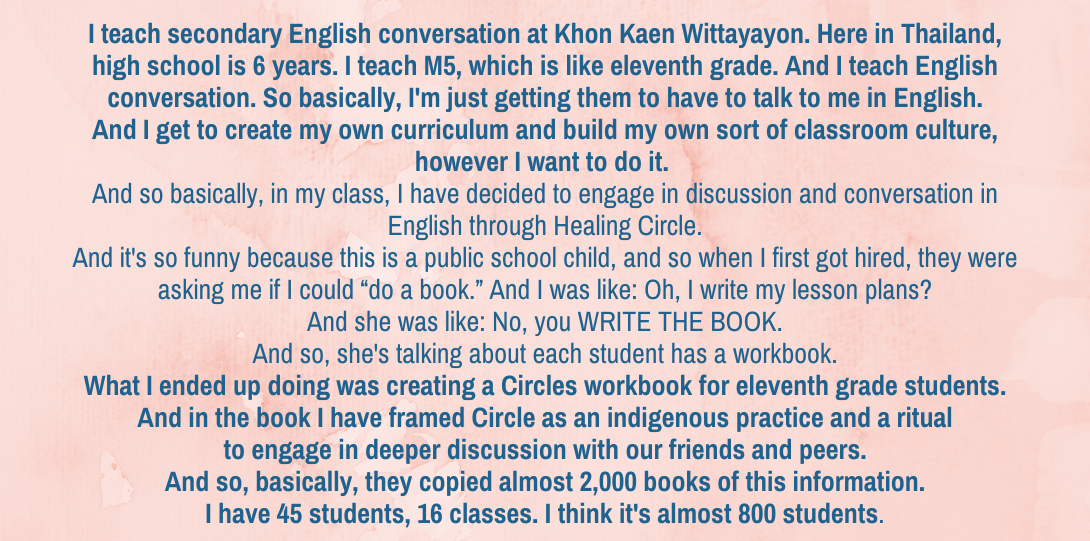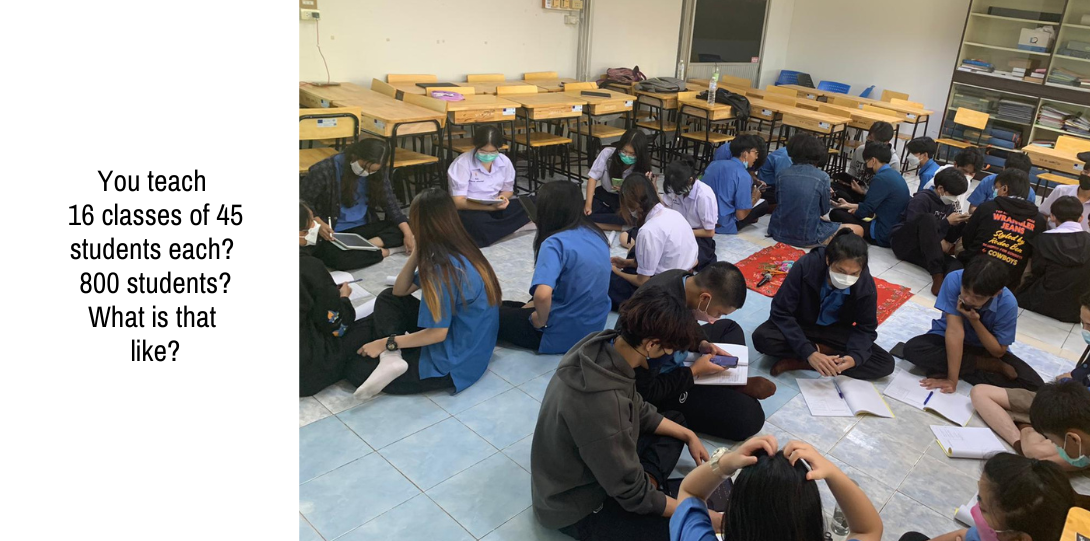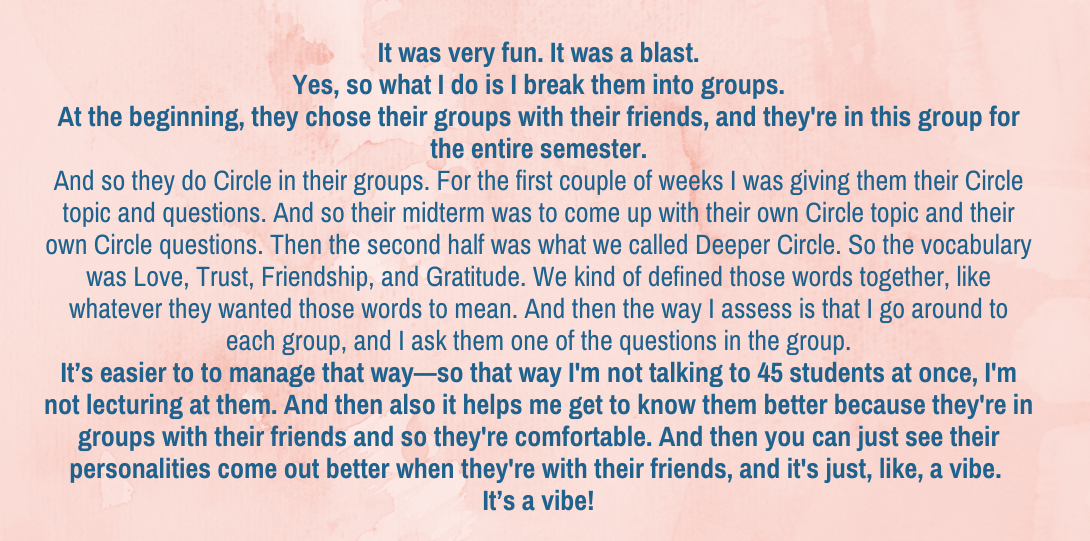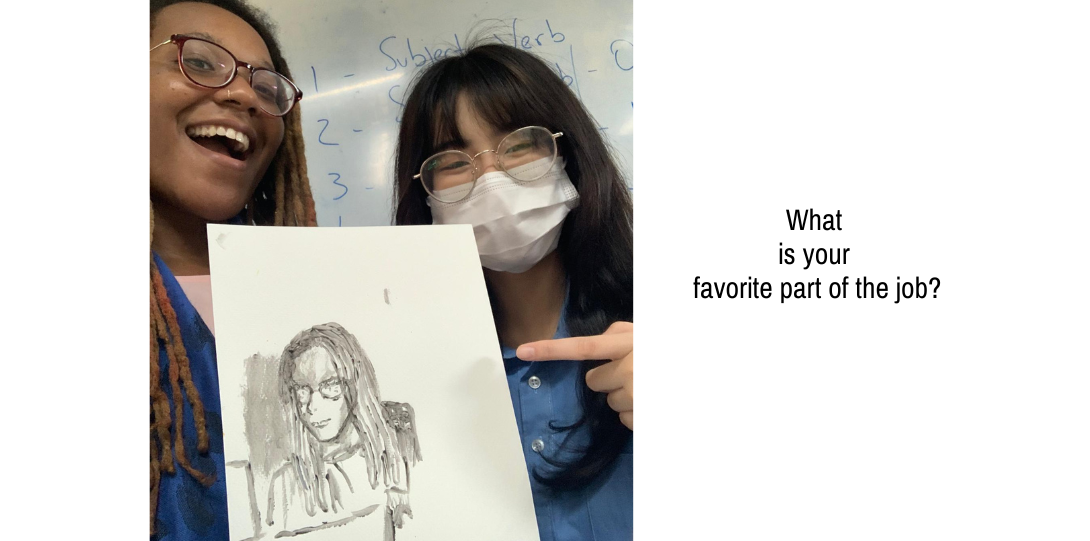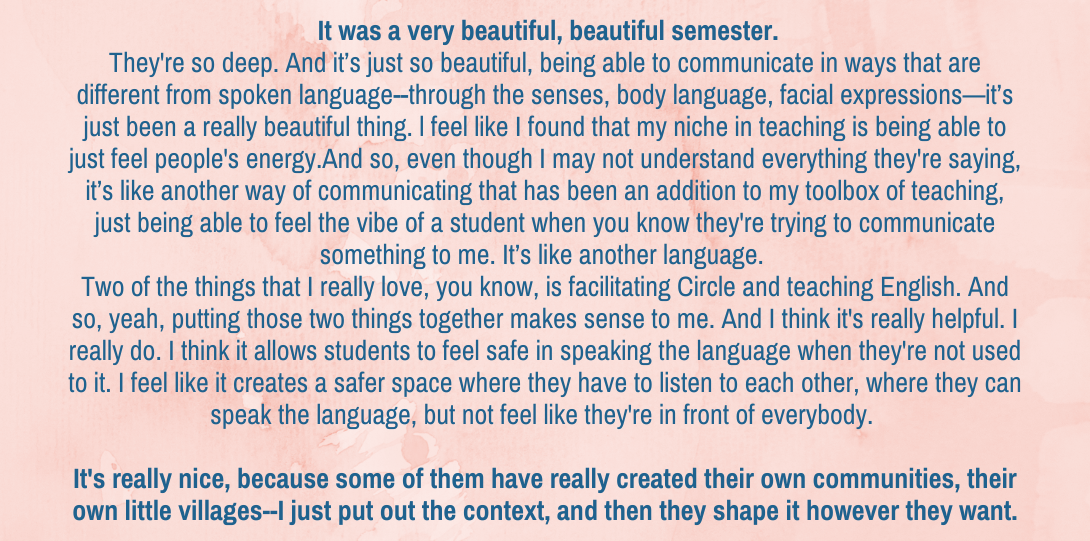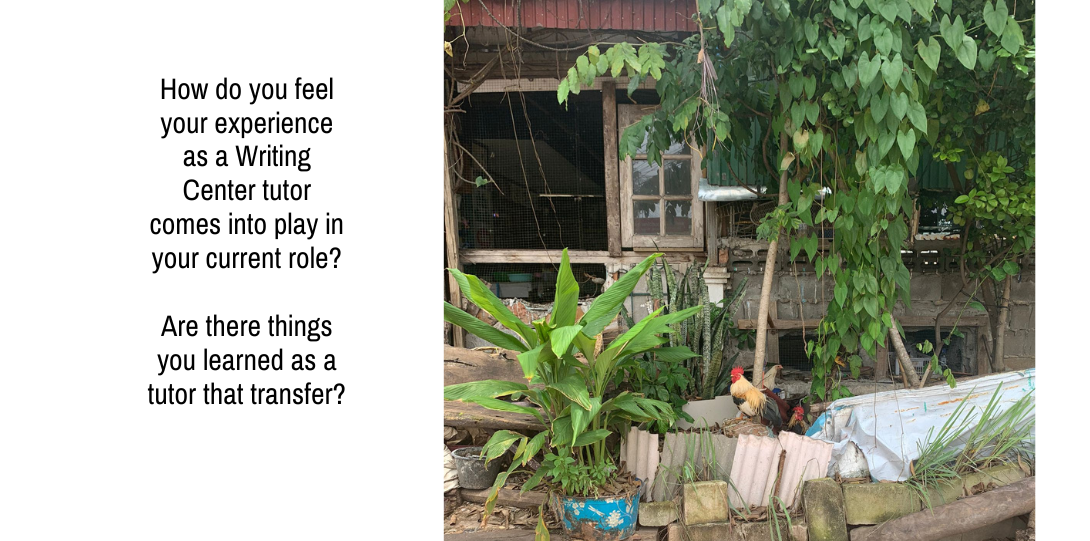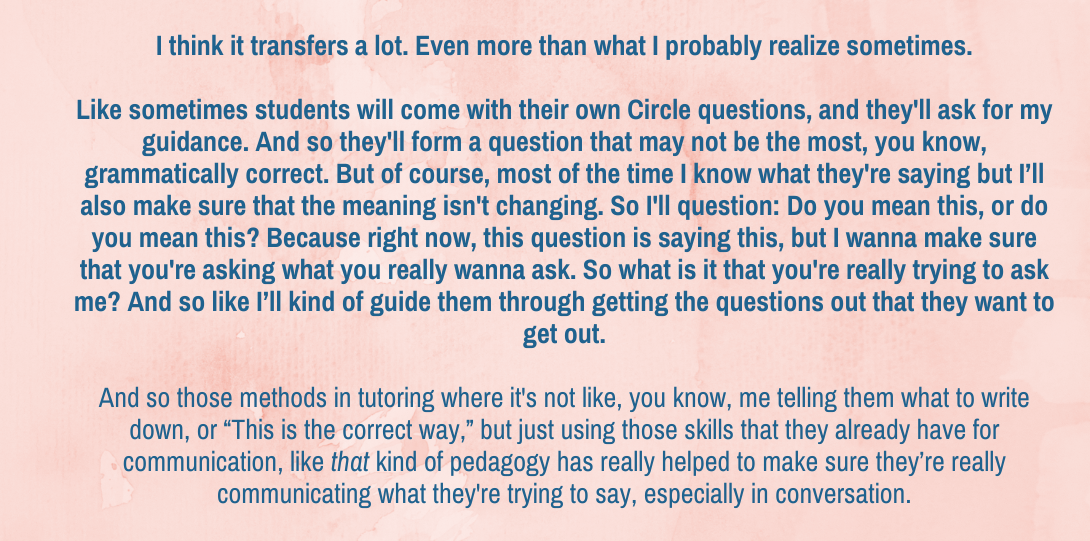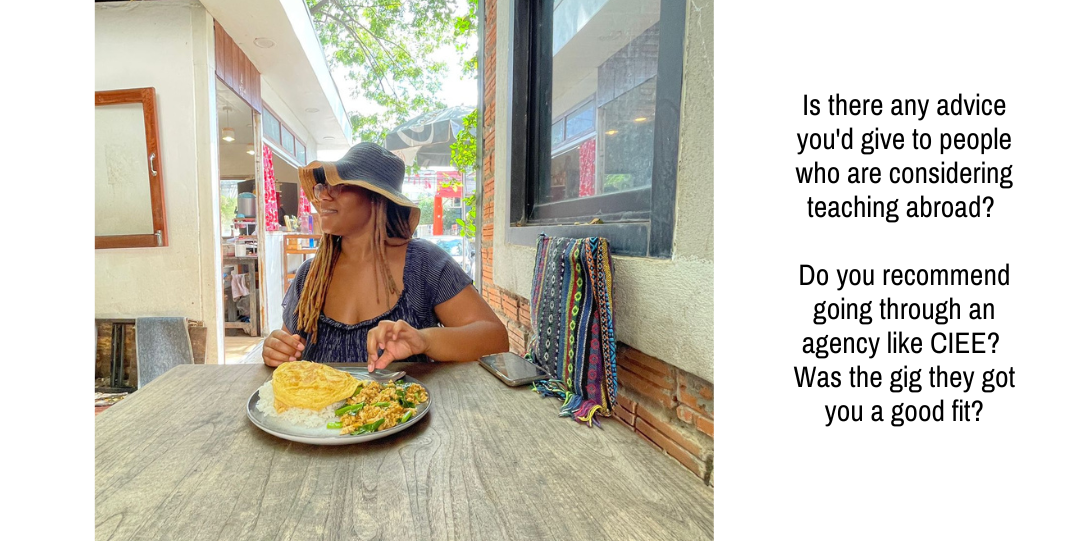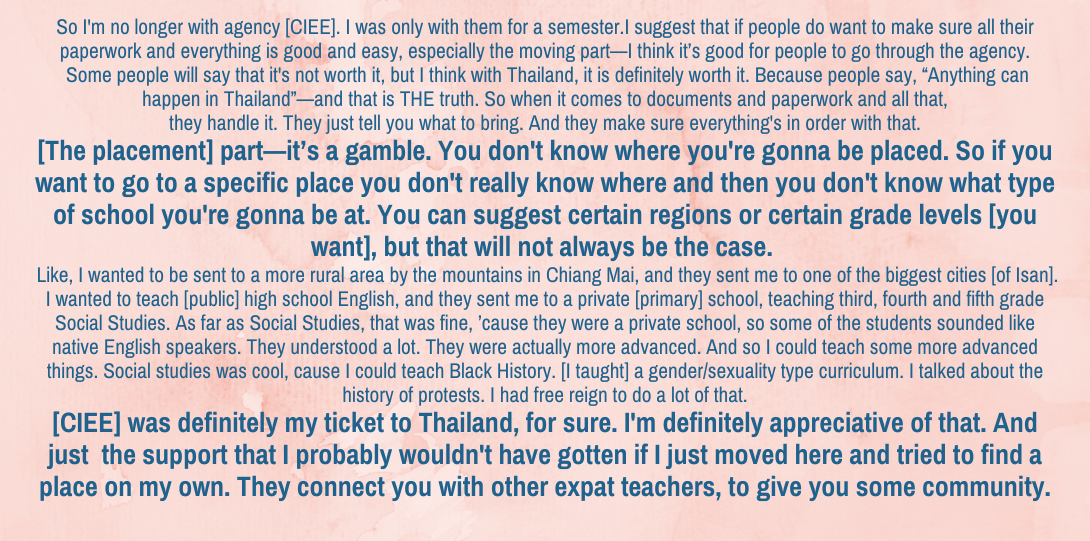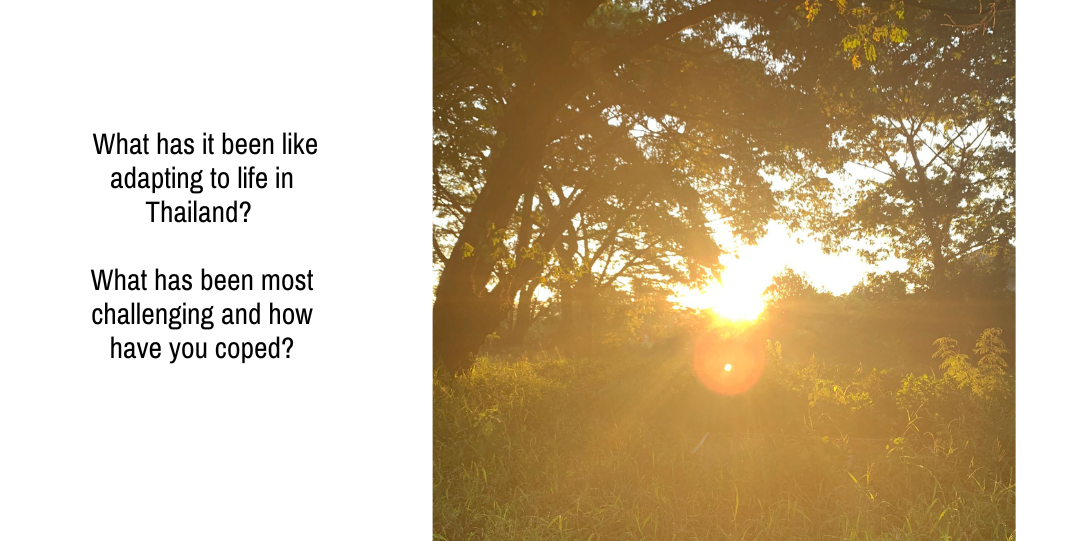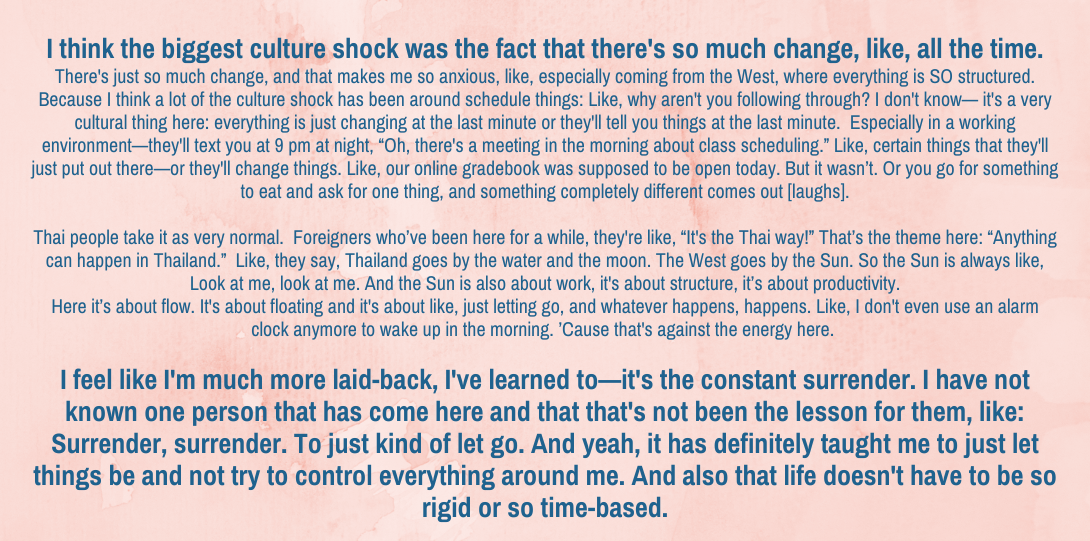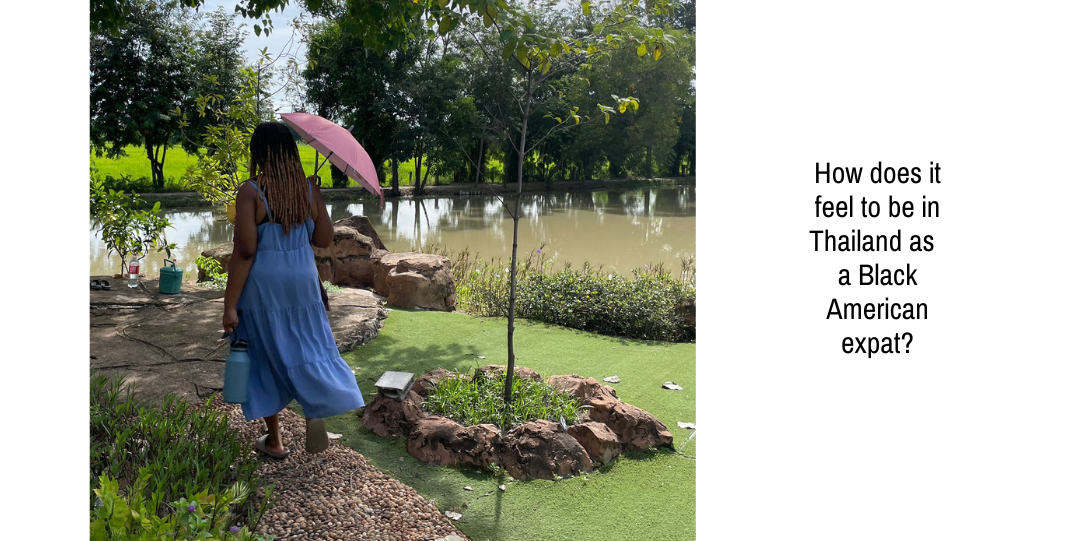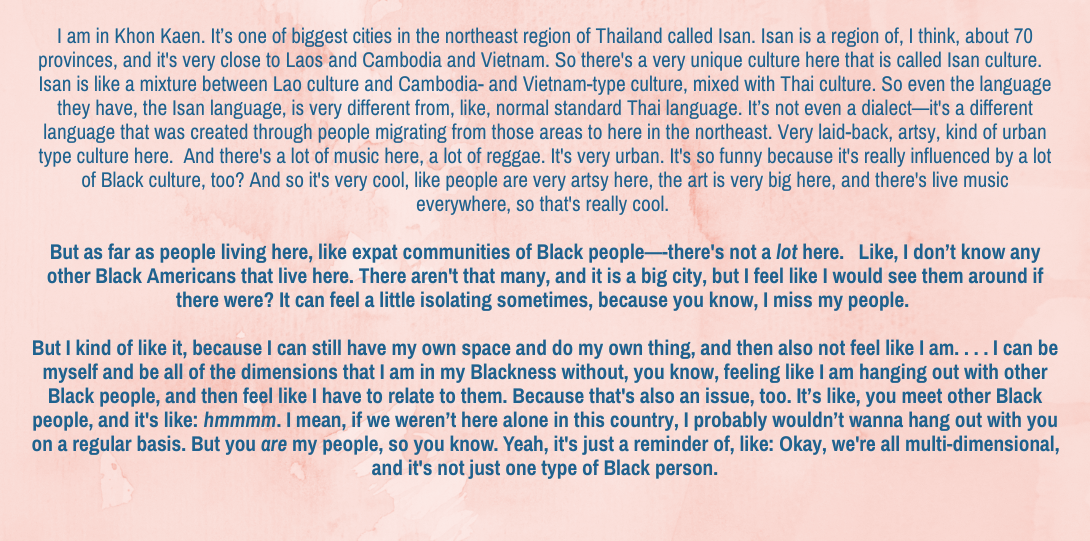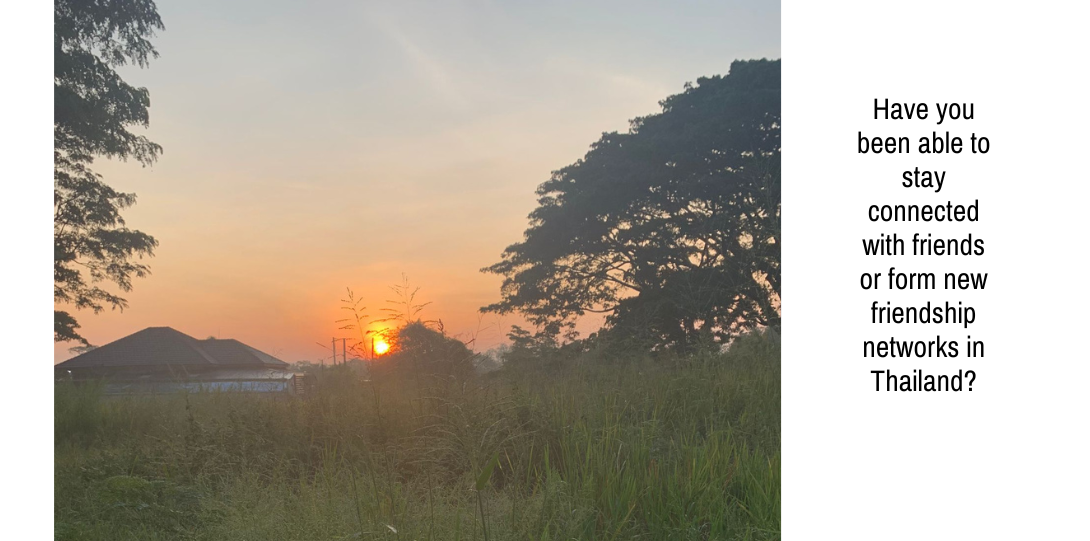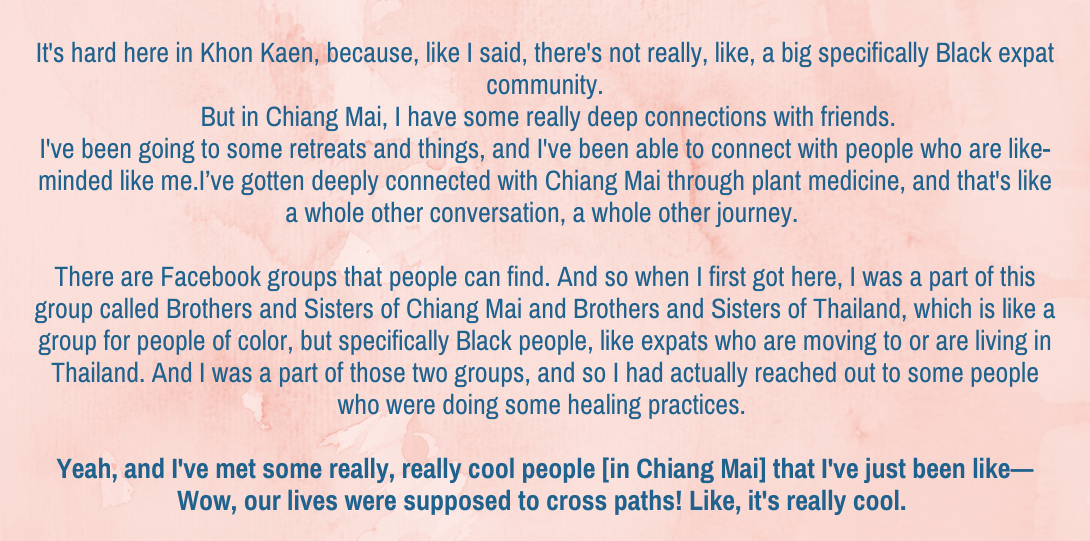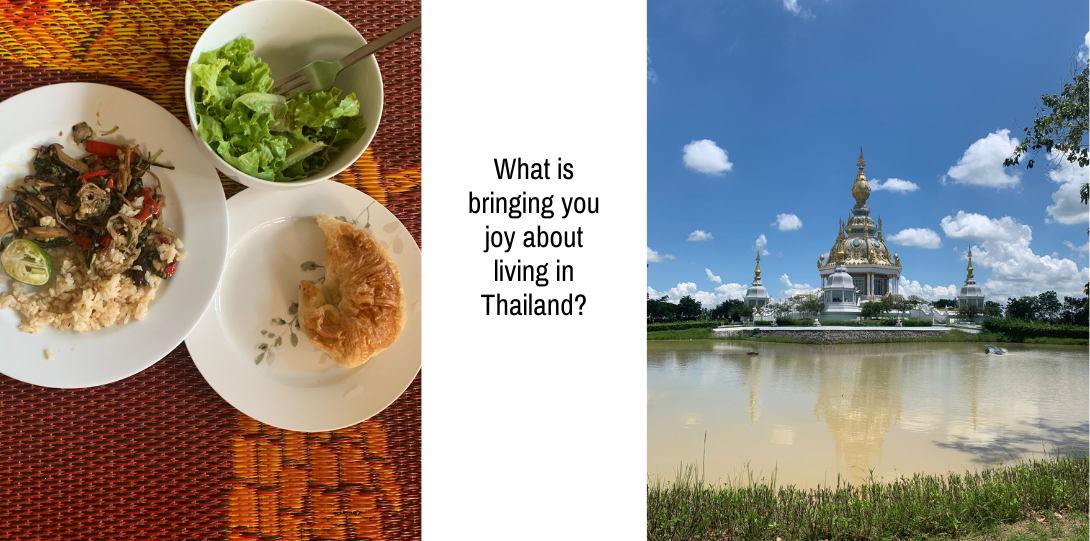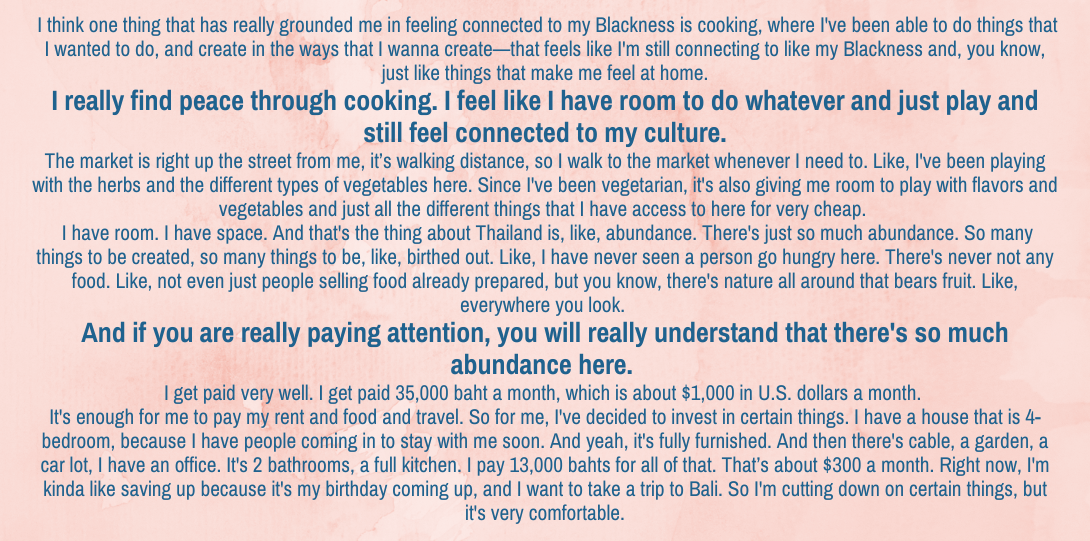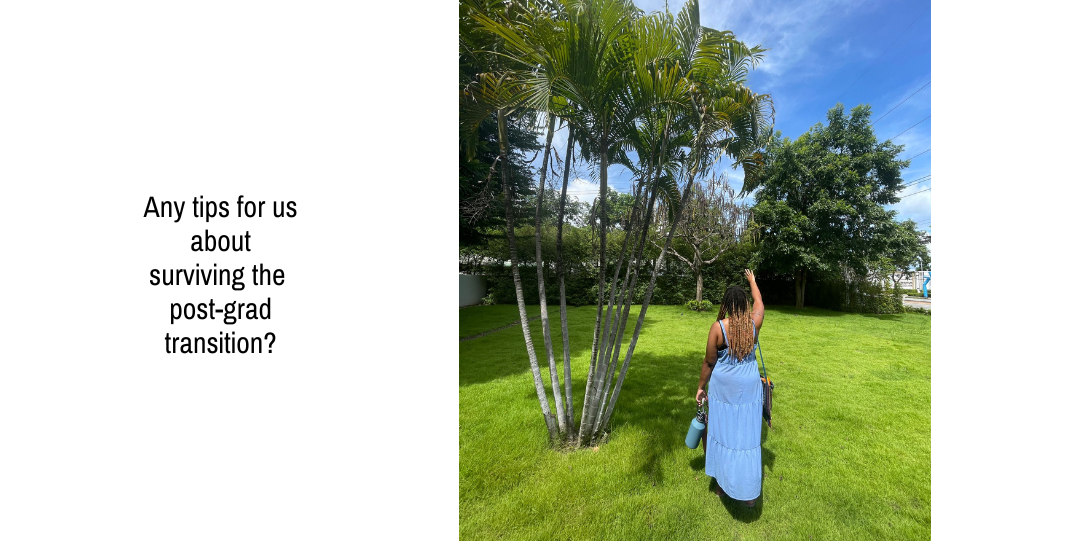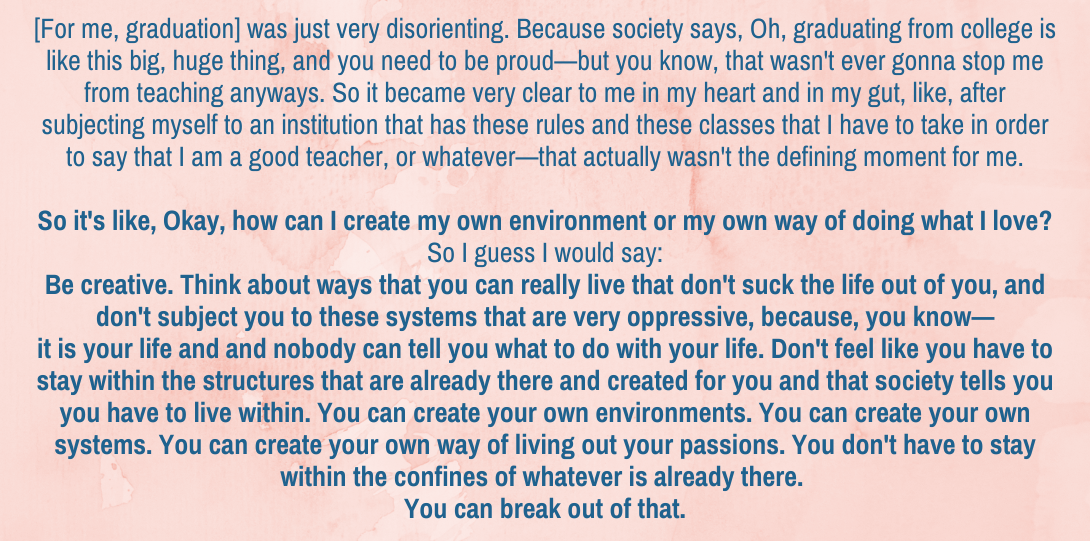Gigi Baker, Writing Center Tutor Alumni Profile
9/22/22 Interview with UIC Writing Center Tutor ’21 alumna, Gigi Baker
9/22/22 Interview with UIC Writing Center Tutor ’21 alumna, Gigi Baker
-
- Pronouns: she/her/they/them
- Graduated: BA 2021 in Teaching of English
- Took 222: Spring 2018 with Kim
- Tutored: F19-S21 as staff tutor
- Now: Teacher of English conversation at Khon Kaen Wittayayon high school.
Where are you these days?
I am in Khon Kaen. It’s one of biggest cities in the northeast region of Thailand called Isan. Isan is a region of, I think, about 70 provinces, and it’s very close to Laos and Cambodia and Vietnam. So there’s a very unique culture here that is called Isan culture.
So, Isan is like a mixture between Lao culture and Cambodia- and Vietnam-type culture, mixed with Thai culture. So even the language they have, the Isan language, is very different from, like, normal standard Thai language. It’s not even a dialect—it’s a different language that was created through people migrating from those areas to here in the northeast.
Very laid-back, artsy, kind of urban type culture here. So yeah, that’s where I am. And there’s a lot of music here, a lot of reggae. It’s very urban.
It’s so funny because it’s really influenced by a lot of Black culture, too? And so it’s very cool, like people are very artsy here, the art is very big here, and there’s live music everywhere, so that’s really cool.
Is there also an African diaspora there? How has Black culture found its way?
So basically, through pop culture. Hip hop and reggae are definitely big here, not just in Isan, but all over Thailand. There’s, like, a reggae scene.
But as far as people living here, like expat communities of Black people—-there’s not a lot here. The only community that is really Black here is the African community: the Cameroonian community and the Nigerian community. Cameroonians migrate to Isan, but that’s for different reasons; that’s because of jobs they’re able to get here, things like that.
But the influence I feel is more through pop culture and TV. So you’ll see graffiti on the walls and you know, just street art, streetwear, things like that. But yeah, it’s very interesting.
How does it feel to be here as a, you know, a Black American expat?
Well, I don’t know. Like, I don’t know any other Black Americans that live here. There aren’t that many, and it is a big city, but I feel like I would see them around if there were? It can feel a little isolating sometimes, because you know, I miss my people.
But I kind of like it, because I can still have my own space and do my own thing, and then also not feel like I am. . . . I can be myself and be all of the dimensions that I am in my Blackness without, you know, feeling like I am hanging out with other Black people, and then feel like I have to relate to them. Because that’s also an issue, too. It’s like, you meet other Black people, and it’s like: hmmmm. I mean, if we weren’t here alone in this country, I probably wouldn’t wanna hang out with you on a regular basis. But you are my people, so you know. Yeah, it’s just a reminder of, like: Okay, we’re all multi-dimensional, and it’s not just one type of Black person.
So yeah, that’s cool. But it can get really isolating because you just miss certain things. I think one thing that has really grounded me in feeling connected to my Blackness is cooking, where I’ve been able to do things that I wanted to do, and create in the ways that I wanna create—that feels like I’m still connecting to like my Blackness and, you know, just like things that make me feel at home.
I really find peace through cooking. I feel like I have room to do whatever and just play and still feel connected to my culture.
What is it like cooking with the ingredients of Khon Kaen? How do you like the food options?
Yeah, so, Isan actually has a very specific cuisine. So, actually, there’s Som Tum, you know, papaya salad?
Yeah, I love it.
So Sum Tum started in Bangkok, but there are different types of papaya salad with different types of flavor. And there’s another type of Som Tum that is prepared in a different way and that started in Isan.
Barbecue is big in Isan.
Yeah, there are different types of Isan food that are really popular here. People come here just for the food sometimes.
But yeah, I’ve been out here, like, really cooking. I have. The market is right up the street from me, it’s walking distance, so I walk to the market whenever I need to.
Like, an open open air market?
Yes, it’s the local market, where, you know, the different vendors are there, especially in the evening time where you can get the prepared foods. But then, you know, there’s other vendors across the street that sell fresh fruit and vegetables, and yeah, I’llget stuff to cook.
Like, I’ve been playing with the herbs and the different types of vegetables here. Since I’ve been vegetarian, it’s also giving me room to play with flavors and vegetables and just all the different things that I have access to here for very cheap.
It does seem like produce is so expensive in the U.S. and it’s so affordable there. You don’t feel you can experiment here with some unusual food or vegetable when it’s like $6 for one passionfruit.
I mean, like, Oh my God! I forgot how much stuff is there.
I mean, I’m probably exaggerating, but it is true that you can pay several dollars for one thing and then you feel it’s a bit too precious, you know, to really experiment?
Yeah, yeah, it’s like—yeah, I have room. I have space. And that’s the thing about Thailand is, like, abundance. There’s just so much abundance. So many things to be created, so many things to be, like, birthed out. Like, I have never seen a person go hungry here. There’s never not any food. Like, you can be in the middle of nowhere and find somebody with their stand selling their meat on a stick for, like, 10 baht which is like 25 cents, or something, not even 25, probably.
It’s just like yeah—you will always have access to food. Like, not even just people selling food already prepared, but you know, there’s nature all around that bears fruit. Like, everywhere you look. And if you are really paying attention, you will really understand that there’s so much abundance here.
And it’s just amazing how I have so much room to just go to the store—and like, maybe something doesn’t work out the way I wanted to, but I can try again tomorrow a different way and not have to worry. . . And it’s right up the street, it is so accessible.
But yeah, I’m making all kinds of things. I’ve been playing with the mushrooms for miso soups.
I’ve been making stews, I’ve been doing different types of curries.
Are you teaching yourself the cooking techniques? Or did you already know how to cook?
So I love to cook anyway. I’ve been cooking, like, on my own, I feel like—you know, just learning adulthood—I could say since I was 19.
And then learning more things like how to use vegetables that are grown in the garden—I feel like I learned before I came here.
So then using what I already have, but then also learning about Thai cuisine: what herbs are used for what, what seasonings are used for what., And using that knowledge and adding that to my repertoire has been really fun. Like, I don’t have to go to the store or to a restaurant to eat fried noodles or fried rice. That’s like a no-brainer.
That sounds delicious. Are you also learning the language, and do you feel like you’re connecting with people locally who teach you different cooking techniques, that kind of thing?
Yeah, so I’ll just ask certain certain people certain things. Like, Oh, what is this?
Or I’ll go to a restaurant, and I’ll be like, Oh, what is this?
And then they’ll tell me and then I’ll ask them, Well, how do you prepare this? And then they’ll tell me how to do it.
There’s this woman that every now and again—like, this is so crazy, I’m, like, living a luxury life—but there’s this woman who helps me clean the house every now and again. And it’s very cheap, by the way; it’s 500 baht which is like $15. And they clean everything. They do the floors, they fold your laundry, they do the bathroom, they do your bedsheets, they clean the patio. Yeah. 500 bahts.
That’s amazing.
Yeah, she used to have a restaurant in the U.S. She actually lived in Illinois, and she had a restaurant. And sometimes she would teach me things, if I’m preparing something. She taught me how to make fried rice properly.
And then I’ll just ask around, you know, ’cause sometimes I just need to know how, and then sometimes, I’ll just figure it out and keep doing it, and then I’ll practice,’cause I have time to do that!
Yeah, this gets to my question about what work is like. So, you have time?
Yes! I have SO much time to the point where I’m, like, bored sometimes. Like right now, it’s so funny, because all of us. . . So we’re done with the semester but we just have to do grades, which is big because I have over 800 students.
Wow!
But it’s fine. It’s just a matter of just sitting down and doing the scores, whatever.
But it’s just so funny because they’re making us go to work today and tomorrow, and technically we don’t have class. They’re making us go to work. Like, it’s so funny because we’ll just sit there. We’ll be like, What are we supposed to do here? We don’t have any classes, nobody feels like grading right now, we got time to do all that. So, we just sit around looking at each other, like, Okay? ’Cause like, when we’re done with our classes, we can leave. So today we waited ’til around noon or so, and then we left. Yeah.
So now I have to ask you to back up and explain. What is the gig here? What’s your position?
Okay, yeah.
So I teach secondary English conversation at Khon Kaen Wittayayon.
Is that a high school?
Yes, it’s a high school. So here in Thailand, high school is 6 years, so there is 6 years of secondary education.
I teach M5, which is the second to last year. There are 6 levels. I forget what it stands for, M5, I can’t ever pronounce the word, but it’s definitely some British-type level name, but I always forget. But I teach M5, which is like eleventh grade.
I teach English conversation. So basically, I’m just getting them to have to talk to me in English.
And I get to create my own curriculum and build my own sort of classroom culture, however I want to do it. And so we all have the freedom to do that.
And so basically, in my class, I have decided to engage in discussion and conversation in English through Healing Circle.
And so it’s so funny because this is a public school child, and so when I first got hired, they were asking me if I could “do a book.”
And so when they asked me that, I was like: Oh, yeah, I can create my own curriculum. Yeah, that’s fine.
And they’re like: A book, a book.
And I’m like: Okay?
And so she gave me an example.
And I looked through.
And she was like: Yeah, you create the book.
’Cause I asked her: Do you want to give us the curriculum, or do you want me to do whatever I want?
And she said: No, you write the book, you write the book.
And I was like: Oh, I write my lesson plans?
And she was like: No, you WRITE THE BOOK.
And so, she’s talking about the workbook. Each student has a workbook.
What I ended up doing was taking out some time and actually creating a Circles workbook for eleventh grade students. So they have access to all of the information that you need to know about doing Circle, participating in Circle, and facilitating Circle.
And in the book I have framed Circle as an indigenous practice and as a ritual to engage in deeper discussion with our friends and our peers.
And so, basically, they copied almost 2,000 books of this information.
That’s a big publication! 2,000 books—is that how many students are in the grade?
There are around 900 students in the grade. There are 17 classes of the same grade, and I taught 16 of them. One of my colleagues taught one class.
How many kids in each class?
45 students.
These are big classes. Wow. You taught 16 classes of 45 students? I can’t even imagine.
It was very fun. It was a blast, it was a blast. And I can send you some pictures.
So yeah, can you describe—what is a 45 person class like? What is happening?
Yes, so what I do is I break them into groups.
And so at the beginning of semester, we created groups, and they chose their groups with their friends, and they’re in this group for the entire semester.
And so they do Circle in their groups, and that way I’m able to manage a little bit more. It’s easier to to manage that way—so that way I’m not talking to 45 students at once, I’m not lecturing at them.
It’s just more efficient. And there were times where we would do Circle all together, maybe once a month. So one day, we had a Pride Circle, like: What are you proud of today? And they wrote down what they’re proud of, and we went around the Circle and that’ll take some time. But they already have prepared it, and it’s one thing, they know what to say, and they just say it in the Circle. And then we did our little party thing. We did like a Gratitude Circle.
But most of the time they’re in groups and I’m able to manage that way. And then also it helps me get to know them better because they’re in groups with their friends and so they’re comfortable and then you can just see their personalities come out better when they’re with their friends, and it’s just like a vibe. It’s a vibe!
And it’s easy to manage because they’re older too, and they manage themselves.
It’s definitely high energy a lot of time, but it’s not as bad as it sounds or as difficult as it sounds. Because they’re in groups, I’m able to manage better, and how I usually run the class is like—so, for the first couple of weeks I was giving them their Circle topic and the Circle question. The first Circle [theme] was Introduction, then the second was Favorite Thai Food. Another topic that we talked about is Favorite Music.
And I gave them the questions. And so part of it is trust, because I trust that they will answer these questions in their Circle. Each Circle has a Circle leader, so they all have a facilitator, and so I trust that they will ask each other these questions, and talk and discuss with one another.
And then the way I assess is that I go around to each group, and then I ask them one of the questions in the group, and that’s how they’re talking to me.
So that way it’s also kind of a Think-Pair-Share type of thing, where they are able to get their answers to these questions together on their own. And then I come around and ask them one of their questions for last-minute assessing.
But yeah, it’s actually worked! I was very surprised. ’Cause this is my first time doing this ever. Especially with this many people.
And they like it. They really like it.
For the first part we did: What do you like? What is your favorite movie? What is your favorite color? That was the first half of the semester. And so their midterm was to come up with their own Circle topic and their own Circle questions.
Then the second half was what we called Deeper Circle. So the vocabulary was Love, Trust, Friendship, and Gratitude. And I taught them those words. We kind of defined those words together, like whatever they wanted those words to mean.
Then they chose one of the words as their Circle topic, and that was their final.
And so yeah. It was a very beautiful, beautiful semester.
Yeah, and they’re so deep.They’re so deep. And it’s just so beautiful, being able to communicate in ways that are, you know, different from spoken language. Just being able to communicate through feeling, communicate through the senses, body language, facial expressions—it’s just been a really beautiful thing. I don’t know, l feel like I found that my niche in teaching is being able to just feel people’s energy.And so, even though I may not understand everything they’re saying, it’s like another way of communicating that has been an addition to my toolbox of teaching, just being able to feel the vibe of a student when you know they’re trying to communicate something to me. It’s like another language.
But yeah, I feel like that has been really beautiful, where they’ve talked about: what does friendship feel like? Like when they say, “[Friendship] is my safe zone, or when I feel happy, or when I know I can trust this person.” I don’t know, just certain ways that they are able to communicate what these emotions feel like to them is just, like—yeah, it is really beautiful. I don’t know how to explain it. But yeah.
It sounds like this is almost one of the benefits of them having maybe not a 100% English fluency is that they have to tap into other forms of communication to supplement a vocabulary that is developmental? But it sounds like it’s also a real strength of yours as a teacher that you can really attend to those other languages.
Yes. And it helps that English isn’t my only language—you know, that I can understand in other ways.
Can I ask as a teacher—I’m curious about the Circle format. How big is the Circle? How many students per Circle? And is the format that a facilitator asks a question that everyone’s already thought about in advance, and then they go one by one in a Circle, answering? Or is it different?
Yeah, so Circle—I don’t know if I should define Circle? The structure of Circle in this context was groups of 8 or 9 and they would choose a different Circle leader every time they had the Circle.
And then the Circle leader would ask the question. They already had the questions, so like I will tell them: Next week we’re gonna do this Circle, so you can answer these questions in your book on your own if you need to. And then I will let them use Google Translate, if they got to class and they didn’t do the homework, ’cause, you know, that be happening. So I would say, Take out some time to answer your questions if you need to. And then they would, you know, listen on Google Translate to how it’s said. ’Cause my objective, for me, is just: as long as you are practicing talking, it doesn’t matter how you learn. It’s like, I’m not your only teacher—Google Translate can be your teacher, too, you know?
So they would have the time to prepare however they needed to, and then talk in the Circle. And then they would create their own kind of culture. Usually you have an opening ritual and a closing ritual. And sometimes they would play a song or sing a song; it was kind of cute, like they would have all kinds of things going on. So for the Friendship Circle, one group kind of did a song, and they held hands.
This is so adorable. Are they 16 years old?
Yeah, 16, 17, yeah. Some of them will take selfies before the Circle and open it up that way. Some of them, especially the smarter, like, the nerdy kids, they’ll play games that have to do with the topic, and if it’s music, you have to translate the song to English in a certain amount of time. They’ll do things like that.
So they’ll come up with their own little games or whatever to kind of open it up or close it, and then they have their own talking pieces in their Circle. So they’re able to create whatever type of space they want to create in the Circle.
And then each person answers each question and then the only thing that I really do is I go around and I ask them one of their questions.
But yeah, it’s really nice, because some of them have really created their own communities, like their own little villages like in their class. And it’s just like—I just put out the context, and then they shape it, however, they want to shape.
Yeah, you’re having a big impact on a lot of people, when I think about how many classes you teach. You said you had how many total students?
Yeah, I have 45 students, 16 classes. I think it’s almost 800 students.
That’s bigger than my entire high school, and I had a big high school.
Yeah.
And is this a public school?
So it is a public school, but it’s one of the top public schools in Thailand. So it’s definitely a pipeline for university. There is a university here in Khon Kaen called Khon Kaen University. And so a lot of people go to this school. Because you still have to pay to go to public school so it’s not free, and however much you pay, that’s what classes you get in. So it’s very hierarchical.
But yeah, it’s like one of the top public schools in the whole country. I think it’s number one in Khon Kaen.
You said it’s very hierarchical and there is still tuition. Does that mean that it’s effectively for middle or upper class students? What’s the class demographic it attracts?
So it’s definitely not like a private school. I was at a private school when I first came here, and they were like doctors and lawyers who are the parents of these students. And they were paying, like, thousands of bahts to send their children to this school.
But this school is more— it’s still a little ghetto. It’s still, you know, rough around the edges, but it’s definitely middle class.
There is something called EP, which is the English Program, and those are the students who are rich. They get to go. They get in those programs. But I teach just in the foreign language department, which is where everybody takes classes, and I get more like the down-to-earth students. Some of them, you know, they have some money. Yeah, there are even some students who actually, their parents sent them, and they live by themselves, and their parents live in, like, the smaller province in Isan.
How did you end up at this school? How did you get the job? What did it take to find your way there?
So I originally went through an agency, CIEE. They do study abroad and teaching abroad programs.
It’s pretty popular; I’m pretty sure UIC has partnered with them before. Yeah, so, I was on their email list because I wanted to study abroad with them at some point. But when I graduated, I was like: I want to teach, but I also want to travel. And I wasn’t really feeling the whole, like, public school thing—or not just the public school thing, but I wasn’t really feeling called to continue teaching in conventional spaces, if that makes sense. Like, I didn’t want to try to fit into a conventional educational space that didn’t allow for me to teach in the way that I feel like I wanted to teach.
And so I was like: Well, how can I do this? How can I still do what I love and not feel like I’m subjected to these very harmful and very oppressive systems?
Yeah, and so I got an email about Thailand? And, actually my friend is from Thailand. She’s from Chiang Mai.
And she was like, Oh, Gigi, you have to go to Thailand. I think you would really love it. We need to go there, 2022, we need to take a vacation there.
I’m like, Okay, good.
This was when I graduated, 2021.
And I saw the email and I was like: Wow, this looks cool.
And at first I was like, I think I’m going to apply just like, you know, for shits and giggles? And then I ended up really thinking about it. I was like: Actually this could be a thing!
And actually I talked to my therapist about it, and she was like: Gigi, this could really happen— you should just go ahead and apply, you know, ’cause you went to school to teach English. You have the degree, and that’s something that you love to do. And you talked about traveling. Just go ahead and apply and just see what happens.
And so, yeah, I applied and got in.
And then I don’t know. . . it was just like one thing after the other. Like, I ended up having the money to pay for the ticket, and everything was falling into place. And so I was like, Okay, I’m gonna just go with this.
And then I’m like flying to Bangkok?
And this was like a couple of months after graduating, right?
Yeah. Yeah, yeah, yeah.Yeah. So it was definitely a very spontaneous thing, but also not. ’Cause it was definitely something that I feel like I needed to do. And I think it was one of the best decisions that I could have made because now I’m able to actually teach in the way that I want to.
I’ve been able to literally do Circle as a way of teaching English? Like, what?
And what’s so cool is that you kind of invented that fusion—you know what I mean?
I guess so?
I’m not sure anyone’s married that teaching philosophy with that teaching context before? That’s pretty innovative.
Yeah, like two of the things that I really love, you know, is facilitating Circle and then teaching English. And so, yeah, putting those two things together makes sense to me.
And I think it’s really helpful. I really do. I think it allows students to feel safe in speaking the language when they’re not used to it. I feel like it creates a safer space where they have to listen to each other. They feel like they’re in a more comfortable place, where they can speak the language, but not feel like they’re in front of everybody.
It’s just, like, a cool way to learn to speak in English. But yeah, I’m even gonna try to create this curriculum and invite some students to come for Circle at my house. And we can do Circle in the garden. And I’m working on that, where we can have English conversation, but I’m gonna teach them some other shit. Like, I don’t know, just talk about different things, like even sex education and gender. I have a lot of students who identify as queer, and so, you know, teaching more vocabulary on queerness and things like that, but by calling it English conversation, so, you know, I don’t get in trouble from the parents.
So would this be something that would be like an afterschool option for kids, kind of like private lessons? Or how do you picture it taking place, inside or outside of school?
Yeah, it would definitely be my thing that I’m organizing outside of school. It would be more like an afterschool thing, but just very unconventional, like, you know: at my house, and we just, like, kickin’ it.
So it would be for kids who want to join it, basically—for the kids for whom it’s like, yeah, I do want to talk about queer identity, and you give them space for that.
Yeah. So I think, like, I would just create a flyer or something and then put it in a group chat or something, and like, whoever wants to come, comes.
That just sounds like such a perfect outlet for your gifts.This is kind of the space you needed because you have something so special and it’s so frustrating that the public school system here does something very different, that can be much more about containing and punishing and regimenting people. That’s not what you do. But you’re finding this way to teach that’s on your own terms and that is really important for these students. I could imagine, if I were a queer student in this class, I would be so psyched to come to your house after school and be able to talk, you know. And it’s kind of a mixture of learning English, but also a therapeutic group, potentially? You know, not a deficit-based idea of therapy, but just a healing, positive, affirming space to be in.
Yeah, it was so funny, because over the weekend, one of my students came over and their dad was with them. And it was so funny because we were talking and everything, and their dad is really chill. And I was talking with them about college applications because they want to study internationally, like in Europe or the U.S. or something. And so I was helping them with that. And then we were doing astrology. I was reading their chart. It was so funny because we found out their dad is a Taurus, and he can’t really speak English, and so my student was translating—it was a really cute dynamic. Then their dad ended up falling asleep and then we just started talking and having our own conversation. Yeah. And oh my goodness—this person, they love speaking English, but they use Google Translate a lot and are not really fluent. But we were having really deep conversations about human life, and they were talking about crazy shit, like we’re in a game situation basically, and just deep thoughts.
That’s amazing that they could articulate that in English, which they’re still learning. That’s hard to do, right?
Yea, and they said, I’m thinking all the time. Like, I’m always thinking about things. And I don’t really know how to really rest my mind because I’m always thinking. And you can tell that there always has to be some sort of mind stimulation. And that’s why they’re dropping out of school, because they just get bored. But they were saying how they don’t really know how to rest their mind. And so I was teaching them about meditation and how that can help– mindfulness and really just sitting and being present
And they were like: Can I go to different places when I meditate?
And I was like: Yeah, if you want to.
And they were saying like: Yeah, I’m gonna go to space because sometimes when I’m here, I feel like I’m in jail. And I just want to travel.
And I was saying: I think meditation can really help with either taking you to another place or you just like not being anywhere and not thinking anything.
And, you know, it was just it was really beautiful because afterwards, [the student was] like,
I feel like my mind feels more steady now. I don’t feel like as bad, with my mind going all the time, because after I talk to you, I feel better. I feel steady.
The way she talks is very— in the ether. Just like, really up there.
But that felt really good that that connection has been developed with some of them. That I have the opportunity even for them to come over to my house. Because I feel like in the U.S. everything is so hypersexual, and there’s not really those opportunities, without getting into the politics of it all, to have those very deep connections with these beautiful, beautiful humans. Yeah, it’s really hard to get there. And so to even just be able to have that opportunity, I’m just so, so super grateful for.
It sounds really almost unconceivable to have that in the high school setting where there are boundaries that everyone’s very policed by. But you’re saying you can actually have deeper level of connection with someone that has nothing to do with sexual anything, it’s just about connecting with somebody, and I can happen outside of school as well.
I feel like you’re gonna have a big influence on their lives.
I appreciate that. I really do. Yeah., Yeah. Because I’m just walking into whatever is placed in front of me. So I’m really grateful that this is what I’m walking into.
It sounds like you also followed an intuition that you needed to put yourself in another place that would be receptive to what you have to offer. And you’re in that place now where it’s like, I see how I can give what I was meant to give.
Can I ask, for you, is this particular job on a year-to-year contract or can you be in it as long as you want?
So, technically, I’m on a one year contract. So, I could renew my contract afterwards. I think I’m in a pretty good place at the school where, you know, they usually don’t like for people to leave if they are in a good place. But yes, right now I’m on a one year contract, which is from last May to April of next year.
Do you feel like this school is a good fit? Would you want to stay on?
I LOVE my gig. I love my job. I don’t like everything about my working environment. There are racial dimensions with that—there’s a lot of Europeans there and a lot of entitled White men there. But anyways, I love my job. I love my gig. I would love to plan on staying here for at least another year to give myself some time to travel a bit more and to just be here for another year.
But yeah, I don’t know. I think maybe I want to move to Chiang Mai? But I don’t know if I would find another gig like this. So it would definitely depend on if I could find something like this where I can do what I want to do and be able to have the freedom and the liberties to do that. But yeah, I definitely want to stay here for another year
And you said that there’s some things about this institution that are challenging. What would you describe as some of the challenges people should bear in mind if they were considering doing something like this, with CIEE—what should they be aware of?
Okay, so I’m no longer with agency. I stopped being with the agency last semester. I was only with them for a semester. Which—I suggest that if people do want to make sure all their paperwork and everything is good and easy, especially the moving part—I think it’s good for people to go through the agency. Some people will say that it’s not worth it, but I think with Thailand, it is definitely worth it. Because people say, “Anything can happen in Thailand”—and that is THE truth. So when it comes to documents and paperwork and all that they handle it. They just tell you what to bring. And they make sure everything’s in order with that.
With that, once you get your ground, if you want to stay another semester, or if you find another job somewhere. . . For me, I went to a different school on my own without the agency, and they helped me with my paperwork. And a lot of it I already had because I was with the agency before, and so I had all those documents in order already.
Also for me, it was a bit easier to switch because I was switching within the same province. If I move to another province, it will probably be a little bit more difficult.
And in general, did CIEE place you for that first semester in a school that was okay? Was that first gig reasonable?
That’s the part—it’s a gamble. You don’t know where you’re gonna be placed. So if you want to go to a specific place you don’t really know where and then you don’t know what type of school you’re gonna be at.
You can suggest certain regions or certain grade levels [you want], but that will not always be the case. Like, I had a friend who literally got the opposite of what she actually chose. She wanted a big city. They sent her to a very small province. She wanted primary school. They sent her to a high school.
So yeah, the same with me. Like, I wanted to be sent to a more rural area by the mountains in Chiang Mai, and they sent me to one of the biggest cities on the east side [of Isan]. I wanted to teach [public] high school English, and they sent me to a private [primary] school. I was teaching third, fourth and fifth grade Social Studies.
So what was that like—suddenly having to teach an age and a subject that you weren’t prepared to teach?
It was a lot. It was a lot—especially moving here and then having to work right away. It was very challenging. It was a lot of adjusting. And I was at a private school and that’s not my thing.
And even from personal statement, I just feel like they was just like: Okay, we’re gonna give her the opposite of her vibe. It was so weird. Or they just threw everything in the air, and let it randomly fall, or something.
It was just like, Oh my God.
But yeah, it definitely taught me a lot about interacting with younger students, and I’ve done that before, at camps and things like that. But it’s been a long time and I’ve realized, like—that’s not my body.
But it was fine sometimes. Like, as far as social studies, that was fine, ’cause they were a private school, so some of the students sounded like native English speakers. They understood a lot. They were actually more advanced. And so I could teach some more advanced things, like storytelling, and challenge them a little bit.
But yeah, social studies was cool, cause I could teach Black History. [I taught] a gender/sexuality type curriculum. I talked about the history of protests. So we could do stuff like that, more political stuff, ’cause it was called Global Citizenship, or something. So I had free reign to do a lot of that.
That was like the funniest thing. But yeah, the English part, I had to teach out of a book. It was like a whole bunch of British grammar, based on, like, British English. So it was pretty funny because it was like, you know—one of my friend’s teaching, and he’s like, Yeah I had to teach vocabulary today, and they call a cookie a biscuit in the book.
Well, it sounds like CIEE got you to Thailand—so in that sense, the agency served its purpose, even if the place they put you was not a great fit?
Yeah, it was definitely my ticket to Thailand, for sure. I’m definitely appreciative of that. And just like, you know, the support that I probably wouldn’t have gotten if I just moved here and tried to find a place on my own. They also connect you with other expat teachers, to give you some community.
Was that helpful being part of CIEE, for the community?
It got me connections to the other people that were in that cohort of people—there were a few other Black girls that were in the same cohort, and we developed, like, a group. We haven’t really kept up with each other that much. But it was good support while it lasted. I think we kind of all just went into our own little things now.
So for other tutors considering teaching abroad, it sounds like CIEE is a good transitional support system to help get your footing initially, if someone’s right out of school?
Oh yeah, I think, yeah, for sure. Like especially if you don’t really have a teaching degree, and you just study English and just wanna travel. I think it is definitely a way to really use those tools that you probably have used in a tutoring space.
You get a lot out of the experience, just being able to travel and you’re still able to use what you know. In a way, I think it definitely makes sense. For the short term, it is definitely, like, a good move.
Is there advice you wish someone had told you before you made the move? Things you would tell yourself now, going back, if you could talk to graduating Gigi?
Hmmm. . . . I think—and this is something that I’ve been repeating for myself since I’ve even just like set foot here—but I guess, like:
Don’t worry, you know? Just surrender. Just float. Don’t worry.
Yeah, something that I’ve been repeating to myself as a mantra lately has been: Everything you have is always in front of you. Just like, surrender.
’Cause I think the biggest culture shock was the fact that there’s so much change, like, all the time.
There’s just so much change, and that makes me so anxious, like, especially coming from the West, where everything is SO structured. Because I think a lot of the culture shock has been around schedule things: Like, why aren’t you following through? I don’t know— it’s a very cultural thing here: everything is just changing at the last minute or they’ll tell you things at the last minute. And so yeah, just kind of telling myself like, Okay, just surrender to the water and the moon. It’s okay.
And you were saying that this is almost a cultural difference—that time and plans are pretty structured in the West, and here it’s a lot more adaptable. Is that how you would characterize it? Can you give examples of that sort of cultural difference?
Yes. So, especially in a working environment—they’ll text you at 9 pm at night, “Oh, there’s a meeting in the morning about class scheduling.” Like, certain things that they’ll just put out there—or they’ll change things. Like, our online gradebook was supposed to be open today. But it wasn’t.
Or you go for something to eat and ask for one thing, and something completely different comes out [laughs].
Do you attribute that to different cultural expectations? Or is it something about the different educational system there? Do other people seem to take this as pretty normal?
Oh, yeah, Thai people take it as very normal. Foreigners are very like—-[laughs].
Foreigners who’ve been here for a while, they’re like, “It’s the Thai way!” That’s the theme here: “Anything can happen in Thailand.” That is the theme here.
Like, they say, Thailand goes by the water and the moon.
The West goes by the Sun. So the Sun is always like, Look at me, look at me. And the Sun is also about work, it’s about structure, it’s about productivity.
Here it’s about flow. It’s about floating and it’s about like, just letting go, and whatever happens, happens. Like, I don’t even use an alarm clock anymore to wake up in the morning. ’Cause that’s against the energy here. That’s not the energy here. It’s not about structure, it’s about waking up whenever my body feels like waking up and knowing that I have an internal drum that has a rhythm. So when this sun reaches a certain place in the sky, I know it’s a certain time. But I wake up when I wake up and just trust in my body. It’s, like, actually very much more anxiety-inducing for me to use an alarm clock here because I’m trying to create a structure or create a system that this side of the world doesn’t go by. So, yeah.
How do you like this new rhythm? Does this feel natural to you? Has it changed you in some way, being on this different rhythm?
Yes, it’s definitely changed me. I’m much more laid-back. I feel like I’m still kind of a control freak. But it is definitely comfortable, so I don’t know how I’ll deal in the U.S.! But I think for me to keep my sanity, I’ve created my own little plans and structures so that that way I can be prepared for whatever happens.
But yeah, I feel like I’m much more laid-back, I’ve learned to—it’s the constant surrender. I have not known one person that has come here and that that’s not been the lesson for them, like: Surrender, surrender. To just kind of let go. And yeah, it has definitely taught me to just let things be and not try to control everything around me. And also that life doesn’t have to be so rigid or so time-based.
Like today, I texted you, and I was like: Oh, like my dinner went over! I’ll be home in, like, 30 minutes. Before, that would have thrown me way off.
Like even how I answered the phone, I’m just like—you know, I changed my clothes real quick. I’m chillin’, you know what I’m saying? I feel like my vibe is a little bit different. It’s not as performative either.
Just to give people a sense of the timeline—would you remind people, when did you graduate?
I graduated last year, May 2021. Yeah.
And you were an English Education Major?
Yes, Teaching of English.
Did you have a minor?
No. Ha! I should! I should. Shit, as long as I was at UIC, I should have a minor.
But when you came, it was the second year of the pandemic. How did the pandemic affect your teaching assignment?
So actually, when I first got here, there was still a lot of restrictions as far as traveling, so we had to quarantine for 7 days.
We first arrived in Bangkok. which is the capital of Thailand. Then when I got to my school, we had to come into the school and [teach] online from the classroom.
And then we had school in person after a few weeks of us being there. And we had to test for COVID biweekly. Then I think cases started going up a little bit. They were very small classes. My fifth grade class was 9 or 10 students ’cause this was a smaller private school. Then at some point they had shut the school down, and we taught online for a while. And then we went back in person. Because I think those decisions were made through that private school, it wasn’t really a government decision.
But since I’ve been at this school this semester, we haven’t shut down at all, and we’re in person.
I did get Covid few weeks ago. I had very light flu symptoms. It didn’t affect my breathing or my lungs at all. It was four of us in the office that got it. I got it from this White man. I just have to say that ’cause —I feel like it was a conspiracy because it was like all the people of color got the virus. I don’t know, like he was coughing all over the office, and we all got it.
Yeah, but thankfully, I only had light flu symptoms. And it was over in like three days.
So yeah, I did get Covid finally for the first time a few weeks ago. But yeah it’s very—everybody wears their masks. It is very normal, you know, to wear your mask. But as far as restrictions, you can travel outside the country.
When we first came here, I don’t think you could travel to different provinces, and things were shut down, like clubs and bars and things. Like when we first got here, they stopped serving drinks at 9 or something. That was wild. You could go to the bar but they stopped serving at 9.
Now, everything is back open.
I also wanted to follow up on one thing you mentioned where you said you have a lot of time. I feel like everybody thinking about these things is like, how do I do that? So, can I ask, what is your typical day like? And does the job pay you well enough that you feel like it’s sustainable and you don’t have to take other gigs? Could you talk about time and money, and how that works so you have an abundance of time?
So for me, I’ve decided to invest in certain things. I get paid very well. I get paid 35,000 baht a month, which is about $1,000 in U.S. dollars a month. I actually took a pay cut, ’cause the private school was paying me around 40,000 baht a month.
But it’s enough for me to pay my rent and food and travel.
Right now, I’m kinda like saving up because it’s my birthday coming up, and I want to take a trip to Bali. So I’m cutting down on certain things, but it’s very comfortable. I think it’s 35 baht to a dollar? So it’s very comfortable. Like 35 baht is a meal. Like maybe a fried rice or something like that.
So cost of living must be lower, ’cause $1,000 a month wouldn’t get you that far in the U.S., right?
Oh, yeah! Oh, yeah. So 35,000 baht—and then so most apartments, like most average apartments are around 5-7,000 baht a month. Food is, like, nothing. Street food is like 50 baht at most. And then, like, if you want a restaurant meal, it’ll probably be like a 100 baht on average, And then if you wanna travel, you can travel to other provinces for maybe like 5,000 baht a month, especially if you travel with other people.
For me, I spend a little bit more. because I have this house. And so I do pay rent for the house, and then you know, I’m very careful—I don’t eat out as much anymore because my body can’t really take street food anymore. And then I cook a lot, so it was very important for me to have the kitchen. If you want a kitchen, a lot of studio apartments don’t have kitchens, but if you want an apartment with a kitchen, it’ll probably be about 7 to 8,000 baht. But I have a house that is 4-bedroom, because I have people coming in to stay with me soon. And yeah, it’s fully furnished. I didn’t have to buy any furniture. And then there’s cable, a garden, a car lot, I have an office. It’s 2 bathrooms, a full kitchen. I pay 13,000 bahts for all of that and then yes so that’s about—I think I did the math—so that’s about $300 a month.
And so yeah. I just decided that that was something that I wanted to invest my money into, because yeah, I mean, shit. I’m not gonna be able to have a space like this for this cheap anywhere else. And I wanted a place for my people to stay when they came here.
So that was my other question—have you been able to stay connected with friends or form friendship networks? What’s been the friendship situation there?
It’s hard. It’s hard here in Khon Kaen, because, like I said, there’s not really, like, a big specifically Black expat community.
But in Chiang Mai, I have some really deep connections with friends.
I’ve been going to some retreats and things, and I’ve been able to connect with people who are like-minded like me.
But my coworkers are actually cool. And my friend, we like—because I have speaking of time, ’cause I have so much time, we just come up with these projects and shit. And so me and my friend thought about coming up with a tea business.’Cause we have access to so many herbs here, we could just be a pipeline for kind sending different herbs that we have access to for very cheap to places that don’t have access to them, or can’t afford them where they are. And so we’re just like, Oh, we could just blend our own teas and sell them to people.
So I’ve been able to make those kinds of connections with my coworkers. But like, here, where I’m at, I feel like it’s more of my workspace. And then it’s just like, I’m in this house and you know, I spend a lot of time by myself.
But as far as, like, friends—I’ve been able to build a pretty solid community in Chiang Mai, which is really cool.
It’s weird sometimes. It could seem a little isolating, depending where you are.
But I don’t know. I feel like it’s just like moving anywhere, it be hard, except for, like, the cultural differences.
You said you you guys have a lot of time—but when you say you have 16 classes, I feel like that sounds like a long day. Can you say what’s your weekly work schedule?
Yeah. So I teach 3 to 4 classes a day. And I see each class only once a week, so I have 3 to 4 of those 16 classes every day.
So it’s very manageable because I have built my curriculum already, and you know, the class is very simple. And I built everything intentionally because I’m like: This is going to be a space of ease. That’s the way I went into it, like: I want to do this with ease. Like, I’m not going to chase around forty-five 16 or 17 year-olds, like, I want them to be in charge of their own learning.
So I will provide the context but, you know, they will do the rest. So the labor and all of the work is portioned out and spread out instead of it’s just on me to do all of it. It’s very, very simple.
And then I come home, and the only grading I do is when they do their Circle and they talk to me, and that’s based on attendance. So like, if you show up to class, if you talk to me and answer the questions, you get that credit. So I’m not, like, grading papers.
So when I come home I’m like, Okay, I got all this time today! Or like on the weekends, I’m like, Okay, So what does today look like? Like I said, I don’t really have a time when I get up. It varies, but most of the time my body naturally wakes up around 6, on average. And you know, I’ll get up and I’ll do whatever I feel like doing—if that means close my eyes and meditating for a little bit, I’ll do that. If that means doing some yoga in the morning, I’ll do that. If that means sleeping in for an extra 20 minutes, I’ll do that. If that means taking a walk and watching the sun, I’ll do that. . I don’t know, I’ve tried to create this structure of, like, I do this every single day, and I’m going to do this every single day. But it’s just never felt good here. Like, it just doesn’t feel like the energy here. So I’ll just do whatever I feel like doing.
I always meal prep, so I always bring my lunch. That is regimen I do on a normal basis to ensure I’m nourished during the day. I’ll pack my lunch, and then I take a bike to work. So there’s something called Grab. I don’t have my own bike. But I’m scared to drive out here. So I don’t have a car, I don’t have a bike. But there’s this app called Grab, which is like an Uber or a Lyft. And they have the car. but then they also have the bike. And yeah, the bike is cheaper, it’s like half of the price of getting a car. So I take a bike every day to work.
Is it like a rental bike? Do you keep the bike, or does someone show up at your house with a bike, and then you take it to work?
No, no. So they drive me, so just like an Uber or a Lyft, like they’ll drive me on the bike.
Oh! So, like a motorcycle.
Yeah, like a motorbike.
And if you want to get around, do you walk just generally to get to markets or to see people? Is it walkable?
Yeah. So the market is definitely nearby, everything as far as like groceries and things like that is definitely walking distance. Like ,the 7-11 and the local markets are right up the street.
And then you know to see friends, I’ll take the bike again, or some of my friends have cars so like I’ll ride with them, whatever.
But it’s not it’s definitely not like Chicago where you can take a train and stuff. They have that setup in Bangkok. But yeah, it’s definitely not like that. But I get around.
Well one of my standard questions that I ask people about is: How does your experience as a writing center tutor come into play in your current role at work? How do you feel like it transfers?
I think it transfers a lot. Even more than what I probably realize sometimes.
Like sometimes students will come with their own Circle questions, and they’ll ask for my guidance. And so they’ll form a question that may not be the most, you know, grammatically correct. But of course, most of the time I know what they’re saying but I’’ll also make sure that the meaning isn’t changing. So I’ll question: Do you mean this, or do you mean this? Because right now, this question is saying this, but I wanna make sure that you’re asking what you really wanna ask. So what is it that you’re really trying to ask me?
And so like I’ll kind of guide them through getting the questions out that they want to get out.
And so those methods in tutoring where it’s not like, you know, me telling them what to write down, or “This is the correct way,” but just using those skills that they already have for communication, like that kind of pedagogy has really helped to make sure they’re really communicating what they’re trying to say, especially in conversation.
But I’m sure the writing center pedagogy has like, really, you know, shaped and molded me in ways that, like, I probably don’t even realize. Like the everyday, the mundane. Yeah, I think most of it has been just kind of guiding them through saying what they’re trying to say. Helping them get that out.
You said you got connected to Chiang Mai because of your friend, but you’ve now formed a kind of community. How did you get to know Chiang Mai?
I’ve been there several times. I’m going there probably again next week.
So basically, I’ve gotten deeply connected with Chiang Mai through plant medicine, and that’s like a whole other conversation, a whole other journey. But I’ve been doing a lot of plant medicine, also psychedelics through some shamans I met there. And they’ve offered up some plant medicines like San Pedro, which comes from the mescaline drug which is from the cactus and I’ve done several of the San Pedro ceremonies, which is plant medicine that is a heart opener. And it’s also more of a communal type of medicine., and it’s all about love.
So it teaches you how to tap into deeper ways of loving, and so I’ve been able to connect with people in very deep ways, but also I’ve been able to keep those relationships and really feel like those relationships have flourished.
Yeah, and I’ve met some really, really cool people that I’ve just been like—Wow, our lives were supposed to cross paths! Like, it’s really cool. But yeah, so I’ve I’ve really been able to build connections with people through these ceremonies that I’ve been going to and receiving plant medicine and learning about plant medicine.
Did you already know about plant medicine and those kind of ceremonies, or did you discover it in Thailand?
Yes, so like basically, it’s crazy ’cause there are Facebook groups that people can find. And so when I first got here, I was a part of this group called Brothers and Sisters of Chiang Mai and Brothers and Sisters of Thailand, which is like a group for people of color, but specifically Black people, like expats who are moving to or are living in Thailand. And I was a part of those two groups, and so I had actually reached out to some people who were doing some healing practices. And so this woman that I met here, she got me connected to this group, and we actually tried the this specific medicine together for the first time.
You’ve kind of hit it upon this, but are there any tips you would want to share with tutors about how to survive the transition after graduation? Any things you’ve learned about how to make it through this uncertain time when you’re leaving the known of a school setting and putting yourself into the world?
Yeah, yeah. So I think it’s all crazy because after, you know, the little graduation (party) thing that I had with my parents and everything like that, during that time I was SO disoriented.
I remember you seemed very anxious. You weren’t sure. There was a CPS job people were telling you to apply for.
Okay. So you picked up on that? Yeah, like, I was just so disoriented. My parents are here. They’ve never visited me in Chicago in all the six years I’ve been here. I felt like they only came because I graduated, and it was like this big accomplishment for them.
But for me it was like, I got out of jail? No, I’m just fine. It was like I got my credentials, okay—but I wasn’t feeling like the biggest accomplishment that I ever made in my entire life, you know? So, it was monumental for sure, but that was only a piece of it. That was like a small victory. It wasn’t like the biggest victory that I felt, like, you know, would happen in my life.
And so even just having a different type of perspective on what it means to graduate from college? Like, to me, that wasn’t like the biggest accomplishment ever. Like, I was proud. But it was like, Okay, but this isn’t my biggest accomplishment.
And it was just, like, very disorienting. Because society says, Oh, graduating from college is like this big, huge thing, and you need to be proud and you have the credentials and whatever—but you know, that wasn’t ever gonna stop me from teaching anyways.
So It became very clear to me that in my, in my heart and in my gut, like you know, after subjecting myself to like, an institution like that, you know, has these rules and these classes that I have to take in order to say that I am a good teacher, or whatever, whatever—
That actually wasn’t the defining moment for me.
So it’s like, Okay, how can I create my own environment or my own way of doing what I love? So I guess I would say like—
Be creative. Don’t feel like you have to stay within the confines or the structures that are already there and created for you and that people or society tells you you have to live within or be within. You can create your own environments. You can create your own systems. You can create your own way of living out your passions. You don’t have to stay within the confines of whatever is already there. You can break out of that. You can manifest that in other ways.
Yeah. So I would just say: Be creative. Be creative, and think about ways that you can really live and exist that don’t suck the life out of you, and don’t subject you to these systems that are very oppressive, because, you know. . .It is your life and you can do what you want with your life, and nobody can tell you what to do with your life. Not any institution. Not any system. Not any structure. You can be creative and do that on your own, and create what you want to create.
To me, it’s really inspiring what you’re saying. People don’t have to just take the received path that’s there. They can envision the life they want, and forge their path to that. Like you sort of in a way invented the job you wanted by thinking what are the things I really value? Here’s how I wanna live. And here’s what I believe teaching should look like. And I’m gonna find a place where that’s possible, that gives me the freedom to do that.
But like you say, that took a lot of creativity, on your part, because there are a people ready to give you ready-made options. Like, here’s a job at CPS, go do that—that might seem on the surface, because they’re readymade, safe or something. But they’re actually kind of soul-deadening. It’s like you’re saying, Look past what’s readily there, the immediate options, and try envisioning more than what’s right in front of you.
Yeah, and I think also there’s so many pressures when you graduate school, it’s this big thing, there’s so many people are looking at you all the time. I don’t know why there’s so much uncomfortable attention. For me, anyway, there was.
Was there a lot of pressure from people in your life to pursue a certain path, or just a lot of attention?
There was definitely, like, a lot of attention, but there’s always been pressure from my family, like, always, ever since I was very young. So that was, like, another thing.
But I think, just the graduation in itself, it’s a celebration, it’s a big thing. You have this big ceremony and it’s like, you know, all these expectations after this big thing.
And it’s why I think another thing is, like: Listen to your gut. Listen to your body and whatever it’s telling you. Because even just thinking back, when people were asking me, like, What are you going to do? Where are you going to teach, what are you thinking?
And it’s like, you know, in my body like, I wasn’t feeling CPS. I was very exhausted from, like, rigid systems of educational institutions, specifically and I wasn’t feeling like putting my body back through that.
And so it’s like, really: Just listening to your gut and knowing and trusting that you don’t have to do anything that you don’t want to do. You don’t have to do anything you don’t want to do.
And like, I think everything falls into place after you decide that you can be creative or you decide that you’re good whatever way—even if, like, you graduated with a, I don’t know, something very specific, like a biology degree and you decide that you know, you want become, I don’t know, a painter? Like, say you study something very specific that was a pipeline for something else, but that’s actually not what you want to do anymore. That’s not what your body’s feeling after four years or six years or, you know, however many years of going through college and these very rigid institutions. It’s like: reassess, and check in with your body so that you can really understand what you have the capacity for and then what you also desire and want for yourself. I think it’s really important.
